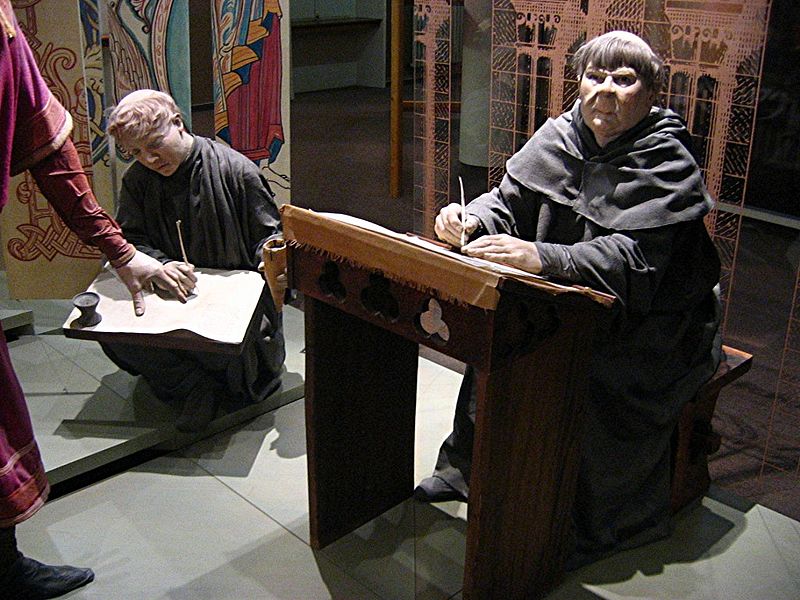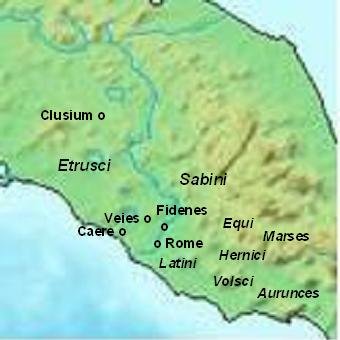(This and unlabeled images from Wikimedia Commons)
The history of the Roman Republic is fascinating, on a number of levels. I find it hard to believe that Hollywood studios haven't discovered some of the stories it contains; there's sex, murder, epic battle scenes, colorful characters, gripping dialogue...
it's not as though those Hollywood schmucks have a surfeit of original ideas from which to choose.
But the most interesting aspect of Roman history for me, (and this is true of history in general) is the way that certain themes echo down the millennia, to be heard in 21st century life. The fact that some things occur over and over in history tells us something very basic and profound about the human condition. The unknown author of the Book of Ecclesiastes nailed this when he said:
"The thing that hath been, it is that which shall be; and that which is done is that which shall be done: and there is no new thing under the sun."
Although there's a case to be made for both air-conditioning and Teflon as exceptions to the general rule.
The history of the Roman Republic is the history of two related struggles. One of these was the struggle by Rome to dominate its neighbors. Reading Livy, one can scarcely believe the sheer number of times Rome went to war with the AEquans (no, that's not a typo) and the Volscians and the Etruscans, and a half dozen other people from the Italian peninsula.
The other struggle was between the Aristocracy and the mass populace. Or, as I like to think of it, between the 1% and the 99%. This struggle went on for the entire period of the Republic, more than 500 years. It was both political and economic. As the mass populace slowly gained more representation and control over the State, the policies of the State slowly began to reflect the economic interests of the masses. The struggle was long, and difficult, and sometimes violent. The masses frequently faced reverses, some of which they brought on themselves by failing to support their own interests.
The entire story is too long to go into here. But I'd like to tell one small part of it; the life and death of Marcus Manlius.
(image from Art.com)
Marcus Manlius was a war hero. In 390 BC, the Gauls captured Rome and burned it. The only resistance left inside the city was a group of citizens holding out in the Citadel, slowly starving to death. The Gauls had problems of their own, and attempted to end the siege by climbing into the Citadel up the side of a cliff. Alerted by the honking of the Sacred Geese, Marcus Manlius led the defense which repulsed the attack.
(image from ancientsites.com)
Nevertheless, Manlius is not treated as a sympathetic figure in Livy's history, being regarded as a demagogue and aspiring tyrant. Unlike contemporary American demagogues, however, Manlius was an advocate for the economic interests of the mass populace. Livy ascribes this to jealousy and ambition, but as a behaviorist I am interested in what Manlius did.
The rebuilding of Rome after the sack left the commoners with enormous debts; having lost everything to the Gauls, people were forced to borrow money in order to rebuild.
And debt was an even more serious matter in those days than in modern times. Interest rates ranged as high as 48% annually, and the delinquent borrower could be imprisoned or enslaved.
(image from FBCSomerset.com)
From Livy:
...the incentives of debt were sharper, as not only threatening poverty and ignominy, but intimidated personal liberty with stocks and chains." And the amount of the debt was immense, contracted by building, a circumstance most destructive even to the rich.
In an eerie similarity to our current debt crisis, veterans were particularly vulnerable to predatory lenders. One of the precipitating events in the tragedy of Marcus Manlius was the arrest of a Roman Centurion for indebtedness.
When he saw a centurion, illustrious for his military exploits, leading off to prison by reason of a judgment for debt, he ran up with his attendants in the middle of the forum and laid hands on him; and exclaiming aloud against the insolence of the patricians, the cruelty of the usurers, and the grievances of the commons, and the deserts and misfortunes of the man. "Then indeed," said he, "in vain have I preserved the Capitol and citadel by this right hand, if I am to see my fellow-citizen and fellow-soldier, as if captured by the victorious Gauls, dragged into slavery and chains." He then paid the debt to the creditor openly before the people, and having purchased his freedom with the scales and brass, he sets the man at liberty, whilst the latter implored both gods and men, that they would grant a recompence to Marcus Manlius, his liberator, the parent of the Roman commons; and being immediately received into the tumultuous crowd, he himself also increased the tumult, displaying the scars received in the Veientian, Gallic, and other succeeding wars: "that he, whilst serving in the field, and rebuilding his dwelling which had been demolished, though he had paid off the principal many times over, the interest always keeping down the principal, had been overwhelmed with interest:
And Manlius was one to put his own money where his mouth was:
A farm in the Veientian territory, the principal part of his estate, he subjected to public sale: "that I may not," says he, "suffer any of you, Romans, as long as any of my property shall remain, to be dragged off to prison, after judgment has been given against him, and he has been consigned to a creditor."
Needless to say, this kind of challenge to the power of the 1% could not be permitted. Manlius was imprisoned.
(image from ABC news)
That didn't work out so well:
On Manlius being thrown into prison, it appears that a great part of the commons put on mourning, that a great many persons had let their hair and beard grow, and that a dejected crowd presented itself at the entrance of the prison...
...And now the affair fell little short of sedition, for the purpose of appeasing which, the senate, without the solicitation of any one, suddenly becoming bountiful of their own free-will, decreed that a colony of two thousand Roman citizens should be conducted to Satricum; two acres and half of land were assigned to each. And when they considered this, both as scanty in itself, conferred on a few, and as a bribe for betraying Marcus Manlius, the sedition was irritated by the remedy...
...they threatened that they would break open the prison; when that being conceded which they were about to take by force, Manlius was discharged from prison by a decree of the senate.
...And now the affair fell little short of sedition, for the purpose of appeasing which, the senate, without the solicitation of any one, suddenly becoming bountiful of their own free-will, decreed that a colony of two thousand Roman citizens should be conducted to Satricum; two acres and half of land were assigned to each. And when they considered this, both as scanty in itself, conferred on a few, and as a bribe for betraying Marcus Manlius, the sedition was irritated by the remedy...
...they threatened that they would break open the prison; when that being conceded which they were about to take by force, Manlius was discharged from prison by a decree of the senate.
Manlius continued to agitate for the interests of the Roman commons. Livy attributes the following words to him:
How long," says he, "will you be ignorant of your own strength, which nature has not wished even the brutes to be ignorant of? At least count how many you are, and how many enemies you have. Even if each of you were to attack an individual antagonist, still I should suppose that you would strive more vigorously in defence of liberty, than they in defence of tyranny.
Collectively you must attempt something, or individually submit to every thing
Dictatorships and consulships must be levelled to the ground, that the Roman commons may be able to raise their heads. Wherefore stand by me, prevent judicial proceedings from going on regarding money
Collectively you must attempt something, or individually submit to every thing
Dictatorships and consulships must be levelled to the ground, that the Roman commons may be able to raise their heads. Wherefore stand by me, prevent judicial proceedings from going on regarding money
Manlius' message continued to resonate with a populace used as javelin fodder in Rome's wars, and financially exploited when they returned home. Even the putative guardians of the Plebeian's interests were threatened by his growing popularity. Finally...
With the approbation of all, they appoint a day of trial for Manlius. When this took place, the commons were at first excited, especially when they saw the accused in a mourning habit, and with him not only none of the patricians, but not even any of his kinsmen or relatives, nay, not even his brothers...
When the day arrived, I find in no author, what acts were alleged by the prosecutors against the accused bearing properly on the charge of aspiring to kingly power, except his assembling the multitude, and his seditious expressions and his largesses, and pretended discovery;
He is said to have brought forward near four hundred persons to whom he had lent money without interest, whose goods he had prevented from being sold, whom he had prevented from being carried off to prison after being adjudged to their creditors. Besides this, that he not only enumerated also his military rewards, but also produced them to view; spoils of enemies slain up to thirty; presents from generals to the number of forty...
...after he had recounted his exploits in war, in pompous language suitable to the dignity of the subject, equalling his actions by his eloquence, he bared his breast marked with scars received in battle: and now and then, directing his eyes to the Capitol, he called down Jupiter and the other gods to aid him in his present lot; and he prayed, that the same sentiments with which they had inspired him when protecting the fortress of the Capitol, for the preservation of the Roman people, they would now inspire the Roman people with in his critical situation: and he entreated them singly and collectively, that they would form their judgment of him with their eyes fixed on the Capitol and citadel and their faces turned to the immortal gods
it became evident to the tribunes, that unless they removed the eyes of men also from the memory of so great an exploit, the best founded charge would find no place in minds prejudiced by services.
When the day arrived, I find in no author, what acts were alleged by the prosecutors against the accused bearing properly on the charge of aspiring to kingly power, except his assembling the multitude, and his seditious expressions and his largesses, and pretended discovery;
He is said to have brought forward near four hundred persons to whom he had lent money without interest, whose goods he had prevented from being sold, whom he had prevented from being carried off to prison after being adjudged to their creditors. Besides this, that he not only enumerated also his military rewards, but also produced them to view; spoils of enemies slain up to thirty; presents from generals to the number of forty...
...after he had recounted his exploits in war, in pompous language suitable to the dignity of the subject, equalling his actions by his eloquence, he bared his breast marked with scars received in battle: and now and then, directing his eyes to the Capitol, he called down Jupiter and the other gods to aid him in his present lot; and he prayed, that the same sentiments with which they had inspired him when protecting the fortress of the Capitol, for the preservation of the Roman people, they would now inspire the Roman people with in his critical situation: and he entreated them singly and collectively, that they would form their judgment of him with their eyes fixed on the Capitol and citadel and their faces turned to the immortal gods
it became evident to the tribunes, that unless they removed the eyes of men also from the memory of so great an exploit, the best founded charge would find no place in minds prejudiced by services.
The trial of Manlius was moved to a location out of sight of the Citadel which he had saved, he was convicted of aspiring to become King, and he was thrown to his death from the very cliff he had defended from the Gauls.
Were Marcus Manlius alive today, I think I know exactly what he'd have to say:








No comments:
Post a Comment